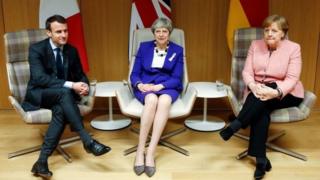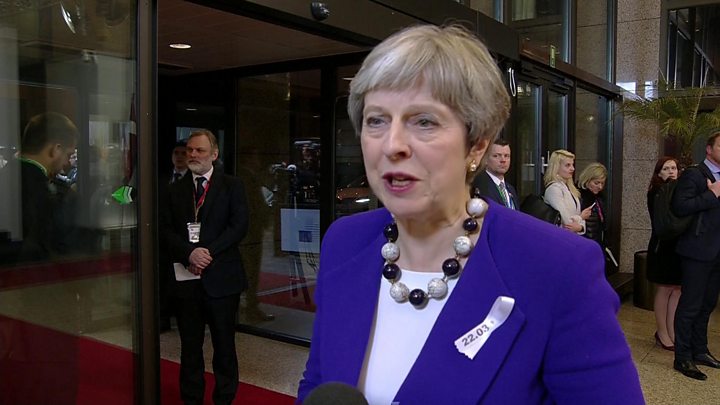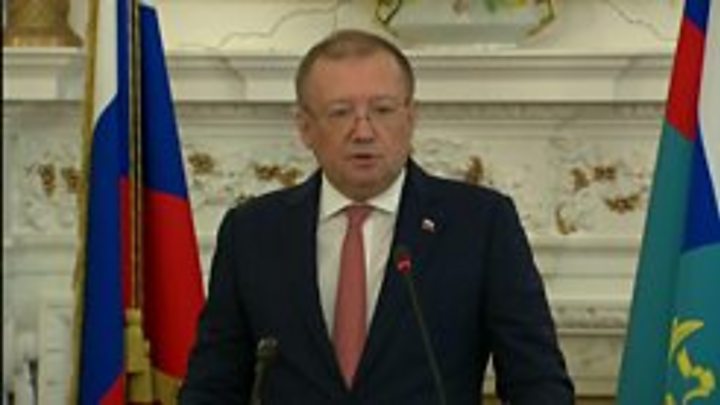 Image copyright
Image copyright
AFP
The EU has recalled its ambassador to Moscow after leaders agreed it was “highly likely” Russia was responsible for a nerve agent attack in the UK.
In a statement, the European Council of EU leaders agreed “there is no plausible alternative explanation”.
Moscow denies responsibility for the attack on an ex-spy and his daughter.
Meanwhile, Reuters reported a convoy of vehicles was seen leaving the British Embassy in Moscow ahead of Russia’s deadline for expelling 23 UK diplomats.
Russia decided to expel the British diplomats in a tit-for-tat response to the UK’s expulsion of 23 of its diplomats.
Former Russian spy Sergei Skripal and his daughter Yulia remain in a critical but stable condition after the attack on 4 March.
- Laura Kuenssberg: Small words, big difference
- Russian spy: What we know so far
- EU summit moves from Russia to Brexit
UK Prime Minister Theresa May said the Salisbury poisoning was “part of a pattern of Russian aggression against Europe”.
The EU said its ambassador to Russia was recalled “for consultations”.
The European Council statement added: “We stand in unqualified solidarity with the United Kingdom in the face of this grave challenge to our shared security.”
Mrs May briefed her counterparts on Thursday on the poisoning of the Skripals, who were found unconscious on a bench in Salisbury.
Detective Sergeant Nick Bailey, who became ill after responding to the incident, is no longer in a serious condition and has been discharged from hospital.
The prime minister set out the evidence the UK has against Russia – including the positive identification of the chemical used as a type of Novichok nerve agent and the knowledge that Russia has produced this agent within the last 10 years.
Analysis
By Laura Kuenssberg, BBC political editor
It might not sound much, but a few small words can make a big difference.
The president of the European Council has used the prime minister’s language about the Salisbury attack, accepting and agreeing with the British verdict that there is no other “plausible” explanation for what happened.
That is a small, but significantly different, tone to the statement a few days ago.
EU ministers would only say: “The European Union takes extremely seriously the UK government’s assessment that it is highly likely that the Russian Federation is responsible.”
The sentiment then was, OK, it might have been them – but you haven’t convinced us yet.

Mrs May welcomed the EU’s statement, saying that it was right “we are standing together” as the threat posed by Russia “respects no borders and it is a threat to our values”.
Irish Prime Minister Leo Varadkar said he supported the EU’s position “very strongly” and Ireland could expel Russian officials if they were shown to be acting as intelligence agents.
He said there would be a security assessment in the coming days with a decision as early as next week.
And Lithuanian President Dalia Grybauskaite said she was considering following Britain’s lead by expelling Russian spies from her country.
But Greek PM Alexis Tsipras said that while he wanted to “express solidarity” with Britain, “we also need to be responsible on that issue”.
Image copyright
REX/Shutterstock
Sergei and Yulia Skripal were found slumped on a shopping centre bench on 4 March
Arriving in Brussels earlier, Mrs May said: “Russia staged a brazen and reckless attack against the United Kingdom.
“The incident in Salisbury was a pattern of Russian aggression against Europe and its near neighbours from the Western Balkans to the Middle East.”
She added that, as the leaders remembered the victims of terrorist attacks in Westminster and Brussels, she would be “stressing the UK’s unconditional commitment to the future security of Europe”.
‘Totally irresponsible’
The Russian ambassador to the UK, Alexander Yakovenko, said Britain had blamed Russia for the poisoning “without any evidence” and his country “cannot accept that”.

He also described as “totally irresponsible” the comments by Foreign Secretary Boris Johnson on Wednesday that likened the public relations gains to President Putin from this summer’s football World Cup in Russia to Adolf Hitler’s use of the 1936 Berlin Olympics.
“Nobody has the right to insult the Russian people, who defeated Nazism and lost more than 25 million people, by comparing our country to Nazi Germany,” said Mr Yakovenko.
Why does the EU have ambassadors?
The European Union has a network of 140 delegations around the world which represent the EU abroad.
The EU nominates ambassadors to those embassies. They play a key role in presenting, explaining and implementing the EU’s foreign policies to their host country.
The current EU ambassador to Russia is German diplomat Markus Ederer, who has previously been responsible for China and Mongolia.
‘Strategic enemy’
Meanwhile, a senior Whitehall official said Russia had “shown itself to be a strategic enemy not a strategic partner”.
The official stressed that the UK’s response to the Salisbury attack had been carefully calibrated to remain within the law, and that the UK was “not looking for some big confrontation with Russia or regime change”.
Labour leader Jeremy Corbyn repeated his calls for a “robust and serious dialogue” with Russia, and hoped for a statement of support for the UK from the EU after the summit.
“We live in one continent,” he said.
“We have to have a process where difficulties can be dealt with.”
But Mr Corbyn questioned statements by some members of government, adding: “I’m not sure the language used by some of our ministers is particularly helpful or sensible.”
Russian spy: EU recalls Russia ambassador after nerve agent attack}

